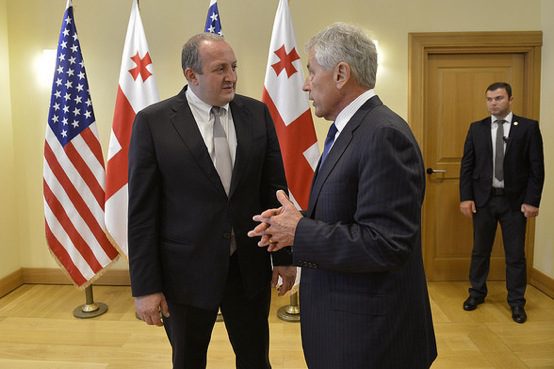Georgia’s Foreign Policy Isn’t Changing Anytime Soon

Svante Cornell overreacts to the recent changes in the Georgian government:
In the past week, the Georgian government has faced a major crisis, as the entire leadership of the country’s foreign and defense structures has been either fired or forced out. The crisis suggests that America’s closest ally in the Caucasus and Central Asia will be mired in instability for the foreseeable future, and that its Euro-Atlantic orientation can no longer be taken for granted.
The last part of this is the most misleading. I suppose it’s true that no state’s foreign policy orientation should ever be entirely “taken for granted,” but the consensus in Georgia in favor of aligning with Western governments and institutions has been and continues to be a remarkably broad and resilient one. One can debate whether that is desirable for Georgia and Western governments or not, but the consensus isn’t seriously in doubt. One of the calumnies directed at the Georgian Dream coalition when it won the 2012 elections was that it was “pro-Russian” in its leanings. The two years since have confirmed that these were lies taken straight from the old ruling party’s propaganda. So it was especially unfortunate that Alasania chose to appeal to these same fears by claiming that his firing represented an “attack on Georgia’s Euro-Atlantic choice.” Perhaps he thought this was the only way to get anyone outside Georgia to pay attention to what was happening, but it makes the same mistake of conflating the political fortunes of a particular person with the country’s overall foreign policy orientation. For good or ill, Georgia will keep pursuing closer ties with Western institutions. Eventually, Georgians may tire of knocking on doors that are never going to be fully opened to them (and at least as far as NATO is concerned they need to understand that they never will be), but for the near future there is no reason to expect a dramatic change in Georgia’s foreign policy.
For a more balanced and less alarmist view of recent events, I recommend Michael Cecire’s analysis of Alasania’s firing and its aftermath. Cecire writes:
But although Alasania spearheaded badly needed reforms in the Defense Ministry and was regarded as a guarantor of pro-Western policies within the coalition, his departure is unlikely to disrupt Georgia’s foreign policy—for now.
He notes that the withdrawal of Alasania’s party from the ruling coalition will have the effect of reducing the overall strength of “pro-Western” elements in the coalition, but emphasizes that his party was not the only one pursuing that agenda. Cecire explains that the cause of Alasania’s firing had to do with domestic political rivalry and did not reflect any change in foreign policy:
Yet despite Alasania’s accusations, there is no firm evidence that Georgian Dream is on the verge of reversing Tbilisi’s pro-Western course. Garibashvili’s unequivocal reiteration of the party’s Western moorings suggests that the government has no intention of following up Alasania’s ejection with a pivot to Russia. By all credible accounts, Alasania’s firing was the culmination of an ongoing rivalry between the popular and ambitious defense minister and Georgian Dream’s billionaire founder, Bidzina Ivanishvili.
Sometimes domestic political quarrels in other countries have nothing to do with the country’s foreign policy or its relationship with the U.S. and other Western governments. This is one of those times. Many Western observers were badly misinformed during the 2012 election about the implications of a Georgian Dream win because they insisted on wrongly viewing a political fight among Georgians over domestic issues in simplistic terms as a quarrel between “pro-Western” and “pro-Russian” blocs, and they should be careful not to make the same mistake again.
Comments